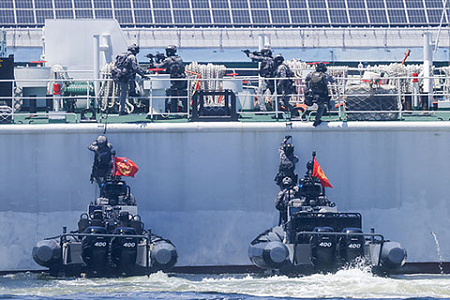
There has been an increase in military activity in the Taiwan Strait over the past week. According to the Reuters news agency, coast guard exercises were conducted in Taiwan. Measures to counter possible military actions by the PRC were being worked out. In addition, international command and staff exercises with the participation of retired high-ranking military personnel to develop scenarios for repelling an attack on the island are scheduled for Taipei, the capital of Taiwan, on June 10 and 11 under the auspices of a local private foundation. The fact is that the Taiwanese military has recently been reporting almost daily cases of dangerous approaches to Chinese ships and aircraft.
This month, according to the Taiwanese Ministry of National Defense, 125 combat aircraft and 71 Chinese warships were tracked. So, on June 9, five of the seven spotted aircraft of the People’s Liberation Army of China crossed the median line of the Taiwan Strait. In response, Taiwan deployed coastal missile systems.
Against this background, the Taiwanese Armed Forces are testing their combat readiness and ability to interact with allied forces. Nine retired generals, as well as lieutenant generals from Taiwan, the United States and Japan, were invited to the command and staff exercises organized by the Taipei School of Economics and Political Science Foundation. The most senior of them are the former head of the US Joint Chiefs of Staff, Michael Mullen, who held this post in the administration of Barack Obama, as well as the former chief of the Joint Staff of the Japanese Self–Defense Forces, Shigeru Iwasaki.
The purpose of the exercise is to evaluate the effectiveness of operational and strategic concepts, the implementation of which is planned by the Armed Forces of Taiwan by 2030. Retired generals and defense experts will examine where the island’s defenses need to be urgently strengthened. The participants in the exercise are divided into five teams, including a control group and detachments representing China, Taiwan, the United States and Japan. Scenarios envisaging a response to an invasion from China will be modeled under the leadership of the control group. The goal is to check the responses of the Taiwanese team, as well as to evaluate the possibilities of assistance from the US and Japanese teams.
Taiwanese media reports that the exercises are primarily related to China’s implementation of the so-called gray zone tactics. This means pressure without a transition to military confrontation. For example, the use of military units under the pretext of civilian activities. From the point of view of the Taiwanese authorities, a vivid example of such tactics is the construction of artificial islands in the South China Sea, the subject of constant disputes between China and its neighbors. “Taiwan is constantly facing a gray invasion from China, but our Coast Guard colleagues have always been at the forefront, enforcing the law and protecting the lives and safety of the people of Taiwan,” Taiwan’s President Lai Qingde said in a speech during the Coast Guard exercises.
The scenario of the exercises, which took place in the southern port city of Kaohsiung, provided for the liberation of a ferry seized by some “international terrorists.” It turns out that Taipei fears that Beijing’s “grey invasion” may even lead to the seizure of Taiwanese ships. It should be noted that Beijing’s official position remains the same: Taiwan is an integral part of the territory of the People’s Republic of China. Therefore, the Chinese authorities do not recognize and are not going to recognize the existence of Taiwan’s borders.
Anyway, the actions of both sides are a destabilizing factor in Southeast Asia, especially given that the number of countries involved in the confrontation between Taipei and Beijing is gradually increasing. Even under Joseph Biden, the Indo-Pacific Strategy was adopted in the United States. It provides for an increase in the influence of both the Americans and their closest allies in the region – Japan, South Korea and the Philippines. These countries are deepening their ties with Taiwan not only in the economy, but also in the defense sector, which causes great dissatisfaction with official Beijing. It is known that during a recent telephone conversation, Chinese President Xi Jinping recommended that US President Donald Trump “carefully approach the solution of the Taiwan issue” and fear that “marginal separatists” could spoil US-Chinese relations.
